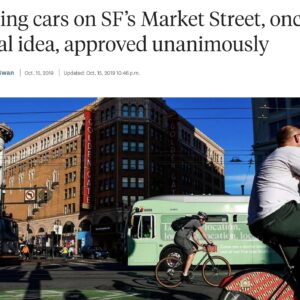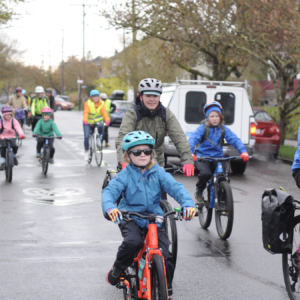It’s impossible to explain the crusade to reform the American transportation system with a quippy slogan. But a successful movement needs a catchy tagline, and some bike and transit activists have settled on “ban cars” as the t-shirt and sticker-worthy phrase to summarize their ideology.
To the average car-dependent American, however, the rallying cry comes with baggage and may seem like bait for Fox News fearmongers. The fight against car culture is much more complicated than simply “banning cars.” So should we go with “ban cars (once we have enough alternate transportation infrastructure to accommodate everyone so they don’t need to drive, and even then there will be exceptions”)? Well…I don’t think that really has the same ring to it.
Those who want nuance are going to have to stick around past the slogan.
In a recent Jalopnik piece (an outlet whose tagline is “drive free or die”), transportation activist and co-host of the War on Cars Podcast Doug Gordon provided some of that nuance in a summary of what the phrase “ban cars” means to him. In the article, Gordon says the ‘ban cars movement’ “wants us to reckon with the truth about the automobile’s impacts on society, to weigh the bad against the good.” He’s explicit about the bad, citing statistics about how many Americans die in car crashes every year (last year, it was 42,915 people) and how much carbon cars spew into the atmosphere. Transportation activists know these stats well, but the general car-driving public doesn’t often come face to face with the destruction cars create.
Gordon writes the ‘ban cars movement’ is not literally a movement to ban cars, and is instead simply a prompt to consider how dominant the automobile is as a part of American society – and is that really so radical?
It’s a fight to expand the rights and freedoms of those who are unable to drive — for medical, financial, or legal reasons — and those who are simply uninterested in operating a multi-ton machine where a momentary lapse of judgment can kill. Given the aggregate ways in which cars negatively impact individual lives, communities, and the planet, I believe a good-faith understanding of “the ban cars movement” is actually less radical than maintaining the status quo, which often seems to take the shape of a ban on everything but cars.
I really struggle to articulate my thoughts on this subject, and I appreciated Gordon’s helpful explanation that contains all the disclaimers necessary when talking about something so controversial. Gordon’s article acknowledged the ways “ban cars” is not an adequate argument against car culture while still defending its usefulness as “a short, pithy message.”
Here’s more from Gordon’s piece:
The goal of “the ban cars movement,” as I see it, is not to render cars obsolete. It’s to give people the choice to live a life where car ownership, and car dependence, are unnecessary — regardless of socioeconomic status or physical ability to operate an automobile. It starts in dense urban areas, places where a few policy tweaks could turn public transit, cycling and walking into the lowest-stress, most convenient options.
No societal effort ever reaches 100 percent success. If the humorously-named “ban cars movement” enacted just a fraction of its goals, people who need to drive, or who simply enjoy driving, would still have that option. Car ownership simply wouldn’t be the price of admission for full participation in society. Or for picking up a gallon of milk.
None of what I’ve described could be accurately called a “ban on cars.” At worst, you could say these are limits on driving in specific locations and circumstances. Taking a lane away from car traffic to install a protected bike route? Sure, that bans cars — from a sliver of pavement. Dedicated bus lanes do the same. At its heart, “ban cars” is not a call to abolish all motor vehicles, but a focused effort to de-emphasize the least efficient form of transportation — the single-occupancy private vehicle — in urban centers where public transit is available and space is at a premium.
I’ve been met with enough backlash after making seemingly reasonable claims about the state of the American transportation system to know this is a topic to tread lightly about. But I also think being overly explanatory can water down the message. Sometimes I get so nervous about coming across as dogmatic or holier-than-thou, I use so many justifiers I end up saying nothing at all.
There’s a fine line to walk here. The transportation reform movement needs as many people on board as possible, and nobody likes to listen to someone on a high horse that makes such a direct affront to the status quo. But given the dire state of the earth and so many things on it, it feels like the right time to push open the Overton window a bit more.
You can read Gordon’s full article here, and be sure to check out the War on Cars podcast if you haven’t already.








Thanks for reading.
BikePortland has served this community with independent community journalism since 2005. We rely on subscriptions from readers like you to survive. Your financial support is vital in keeping this valuable resource alive and well.
Please subscribe today to strengthen and expand our work.
A few policy tweaks.
This kind of magical thinking is one of the reasons that active transportation politics is a farce in the USA.
We already tried this with the “defund the police” slogan, and the only result that happened was severely damaging the standing of the police reform movement among the majority of the US. Now it’s a slogan that’s just associated with failure. Why will this be any different?
If you want people to listen to your cause, pick a slogan that doesn’t need tons of explanation to explain your goals. It’s why “lock her up” or “build the wall” were very effective slogans — abhorrent, but effective — while “defund the police” and “ban cars” are counterproductive. If somebody asks you “why should we ban cars” and then you have to say “no, we’re not actually banning cars”, that frankly makes you look like an idiot with no credibility.
I might go a step farther and point out that sloganeering (bumperstickers, memes) is a great tool for vectoring destructive or counter-reality ideas, and not much else. They’re the favored weapon for reactionary propaganda. Maybe not a surprise that when progressives try to use this weapon it gets turned against us.
Progressive POLICIES are broadly popular with pluralities or majorities of Americans, but they are not easy to break down into slogans. And no, I have no idea how to “fix” this but “defund the police” is a textbook example of how the slogan wrecked the (actually pretty popular!) policy direction
I would respond with the question “why ban cars” by saying – because they prevent me from walking and biking around safely. I would hope it would lead to a discussion about building better streets. I see no correlation with “defund the police”. Police make it safer for me to walk and bike, which seems to have been forgotten by many. In fact, i am going to get a Ban Cars tee shirt and see what happens. I will wear it when not wearing my Blue Lives Matter tee shirt. I think they go together perfectly.
Safer for you, not for everyone.
How do you lose to the Trump Cult?
You nailed it.
Look at Portland, the 100 lost souls that break windows all the time and are not disowned by local politicians and then they wonder why there is a backlash going on….
On the other hand, ACAB was not a very effective slogan.
mean snobs and stupidity create ridiculous meme. . .
There’s a long history of popular leftism in America. Left-of-center politicians of the 1900’s relied on patriotic, pro-growth messages to attract people to a vision of a better, brighter future. We built cities, created National Parks and Wildernesses, enshrined a woman’s right to choose, fought segregation, lifted millions out of darkness and poverty (my family saw the Tennessee Valley Project up close and personal), and built durable governing majorities. Even if you see modern America as a truly unjust place, do you really think a woman, a gay person, or a Black person would have been better off in 1915?
In comparison, it’s disheartening to see the left’s modern messaging: there’s a lot of self-blame, guilt, hair-shirt environmentalism, etc. I’d love to see the kind of “car-unnecessary” future that Doug Gordon writes about, but I fear that literally telling people that we’d like to ban their car isn’t a good way of bringing that future about.
Many people rely on their cars, and will react negatively to any slogan that represents a political project of pulling that rug out from underneath their feet! It’ll be hard to break through their reflexive, self-defensive disagreement, even if the vision has some attractive qualities.
It’s time to envision a better future, and tell people about it directly!
Exactly. What we’re for, not what we’re against.
I’ll put in a plug for “Crash Course: If You Want To Get Away With Murder Buy A Car” by Woodrow Phoenix (War on Cars covered it a while back). It’s a graphic novel whose illustrations do a good job showcasing how alien and inhumane automobile infrastructure actually is at a more visceral/emotional level.
As someone who has recently reverted to driving because the mass transit options suck (very badly) when trying to get from St. Johns to Hillsboro, I find myself somewhat ambivalent. Do I take four hours per day commuting by mass transit or accept one hour driving? I tried. I really tried for three months, to commute to and from the office via Trimet. The last straw was when driver shortages made the trip unpredictable. After several three hour, one-way commutes, I’ve given up. Time to buy an EV, I guess. I hate this choice but don’t know what else to do. Moving closer to work is not an option, neither is a pure work-from-home approach. I accepted a hour-plus one-way trip in the name of lowering my footprint, but two-plus or more one-way? I don’t think so. Sigh…, we need to do better. Maybe an ebike would work, but it’s an expensive experiment. Does anyone rent bikes for extended trial periods?
That does suck! I’m looking at moving out of my home in SE. I like some of the houses in SW Portland, but I’m worried about the increased mileage of the commute downtown. So, I’m looking at buying at e-Bike. I’ve never ridden one! But if it turns an athletic 45 minute commute into a relatively relaxed 30 minute commute, it will keep me riding, instead of driving.
Maybe you could borrow one to get a sense of how comfortable it would be to ride that fast?
Bike Friday offers ebikes that are more affordable than other ones and are welded in Oregon.
Thanks, Taylor. Great points.